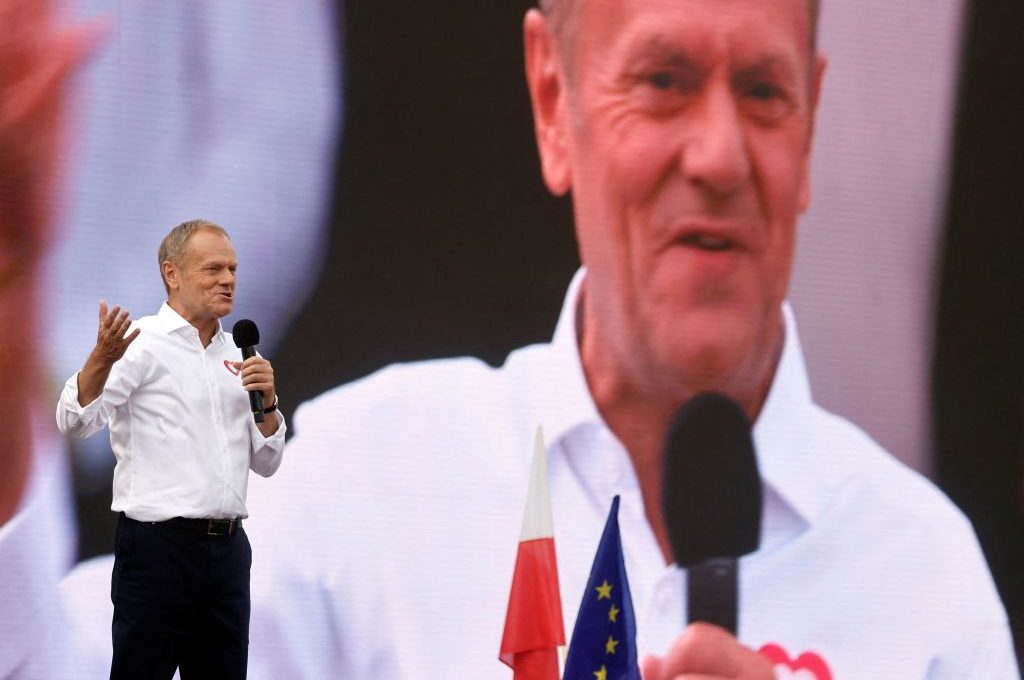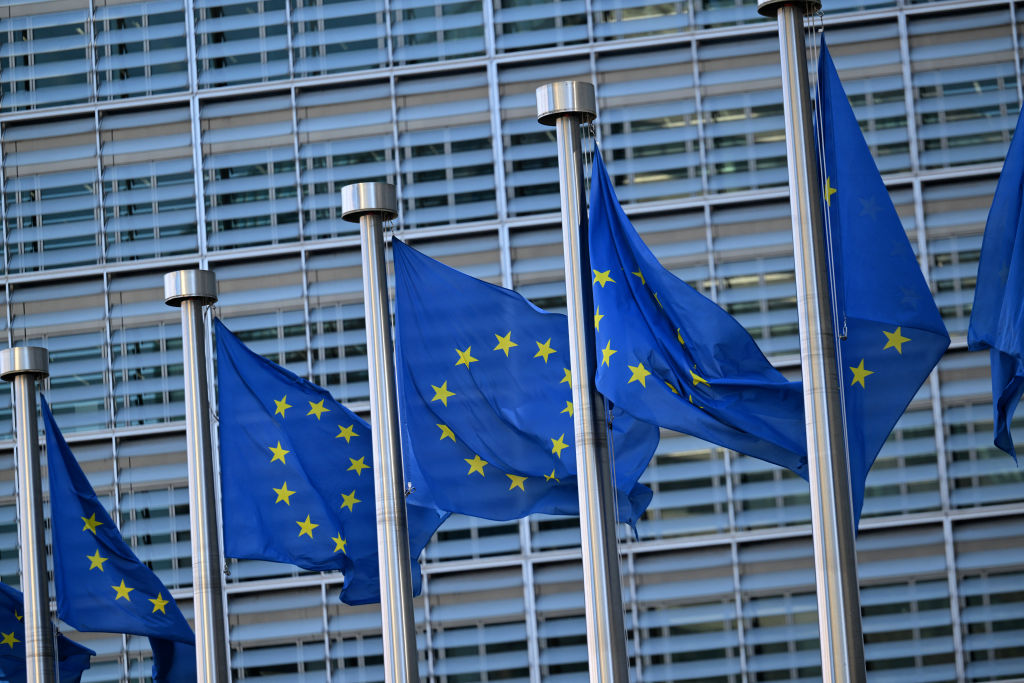Poland is heading for a highly divisive and polarized election on October 15. The country’s right-wing Law and Justice (PiS) Party, which has ruled since 2015, is highly critical of the institutions and elites that emerged following the collapse of communism in 1989. And it has broken with the Polish foreign policy consensus pursued by previous governments, accusing them of aligning too closely with Berlin and failing to stand up for Poland’s interests within the European Union.
As a consequence, Law and Justice has come in for heavy criticism from both its domestic opponents and the EU political establishment for undermining democracy and the “rule of law,” particularly for its judicial reforms. It strongly rejects this, accusing its critics of politically-motivated double standards.
For a long time Law and Justice retained high levels of popular support, and in 2019 it secured re-election with an unprecedented second outright parliamentary majority. This was because it largely delivered on its programme of large social welfare programs aimed at less well-off Poles living outside of the urban centers who felt that they had not benefited sufficiently from Poland’s post-1989 economic transformation.
But since the fall of 2020, Law and Justice has lost support, largely due to economic insecurity and falling living standards. Law and Justice is still the largest party in the polls but it looks set to fall some way short of retaining its overall parliamentary majority this year.
The party has tried to fight back by casting the election as a straight choice between itself and the liberal-centrist Civic Platform (PO), Poland’s governing party between 2007-15 and currently the main opposition. Law and Justice feels that this strategy can persuade many of its more reluctant supporters to turn out and vote, particularly if the opposition becomes synonymous with Civic Platform leader Donald Tusk, who was prime minister in 2007-14 and then returned to Polish politics in 2011 after a stint as European Council President. There is little evidence of crossover between the governing and opposition camps so the key to victory will be which side can mobilize its supporters to turn out to vote. Although he is a very effective campaigner and critic of the ruling party, polls show that Tusk is an extremely polarizing figure, with loyal devotees on the opposition side but also fierce opponents among the Law and Justice core electorate.
One effective Law and Justice tactic has been to call multiple referendums on the same day as the parliamentary poll. These include questions designed specifically to remind voters about various unpopular policies and stances associated with Civic Platform, and particularly Tusk, such as his government’s raising of the retirement age to sixty-seven which Law and Justice lowered back down to sixty for women and sixty-five for men.
Law and Justice’s original 2015 election victory reflected widespread disillusionment with the country’s ruling elite and a strong prevailing mood that it was time for change. Given that Tusk was prime minister for seven out of the eight years that Civic Platform was in office, few politicians better embody the previous government. Law and Justice believes that, however frustrated Poles may be with the current administration, most of them do not want to see a return to the status quo ante. Interestingly, this polarization also appeared to suit Civic Platform and Tusk, whose electoral strategy until recently seemed to be based on the premise that most Poles are tired of the government and that it only needs to persuade them to rally around the main opposition party if they want change.
Two of the four referendum questions are on migration issues. Poles will be asked if they oppose the removal of a fence erected last year on the Polish-Belarusian border to prevent illegal migration. And whether they support a new EU “migration pact,” which will require member states to either take in a minimum number of migrants or make “solidarity” payments of €22,000 per migrant not accepted. These questions are meant to tie in with and highlight Law and Justice’s overarching campaign themes of security and national sovereignty.
The migration issue has proved to be something of a double-edged sword for Law and Justice. A scandal involving the sale of Polish work visas has led to the resignation of the responsible minister and criminal charges being brought against other foreign office officials. It has also allowed Civic Platform to turn the tables on Law and Justice and highlight the fact that the government has overseen Poland’s largest ever wave of immigration, including many more foreign workers from outside Europe than the EU was planning to transfer, suggesting that many of these work visas may have been allocated in a fraudulent way.
Since then, a series of further developments, such as the German government introducing additional checks on its border with Poland, have meant that the migration issue has, somewhat unexpectedly, come to play a very significant role in the closing stages of the election campaign. Law and Justice feels that ultimately it will benefit from migration becoming a salient campaign issue because the opposition is not focusing on questions where the government really is much more vulnerable, such as economic insecurity. It may also inadvertently legitimize Law and Justice’s narrative that uncontrolled mass migration from predominantly Muslim countries undermines Polish security, allowing the ruling party to refocus on to the question of compulsory EU migrant relocation quotas where the opposition is vulnerable.
Just as important as the struggle between the two main groupings is what happens to the minor parties. In order to secure a majority, all three liberal, centrist and left opposition groupings need to cross the parliamentary representation threshold. One of them, the eclectic “Third Way” (Trzecia Droga), comprised of a long-standing agrarian party and new liberal-centrist formation led by TV personality-turned-politician Szymon Hołownia, is hovering dangerously close to the 8 percent threshold for electoral coalitions. Civic Platform appears to be realizing that its polarization strategy may backfire if the party simply increases its support at the expense of the smaller opposition groupings.
At the same time, many polls predict that the balance of power in the new parliament will be held by a radical right free-market party, the Confederation (Konfederacja). The Confederation is playing the long game and, to avoid undermining its “challenger” appeal, is more likely to prop up a minority government through an informal governing pact than make a formal coalition agreement with either Law and Justice or the other opposition parties.
The Confederation would appear to be ideologically closer to Law and Justice but it will be difficult for the two parties to come to an agreement because reducing state intervention and criticizing the large ruling party’s flagship social welfare program is a core element of the challenger’s free market appeal. It may actually be easier for the Confederation to (at a price) allow the opposition to form a government. They could sell this as giving the opposition a chance to prove itself. Either way, any arrangement is likely to be very unstable and highly likely to culminate in another early parliamentary election.
The election remains too close to call. Most Poles are clearly dissatisfied with many aspects of Law and Justice’s performance in government, but they are also wary about handing the reins of power back to Tusk and Civic Platform. Which of these proves to be the strongest drive, together with the performance of the minor parties, is likely to determine whether or not Law and Justice is re-elected for a record third term.
This article was originally published on The Spectator’s UK website.

























